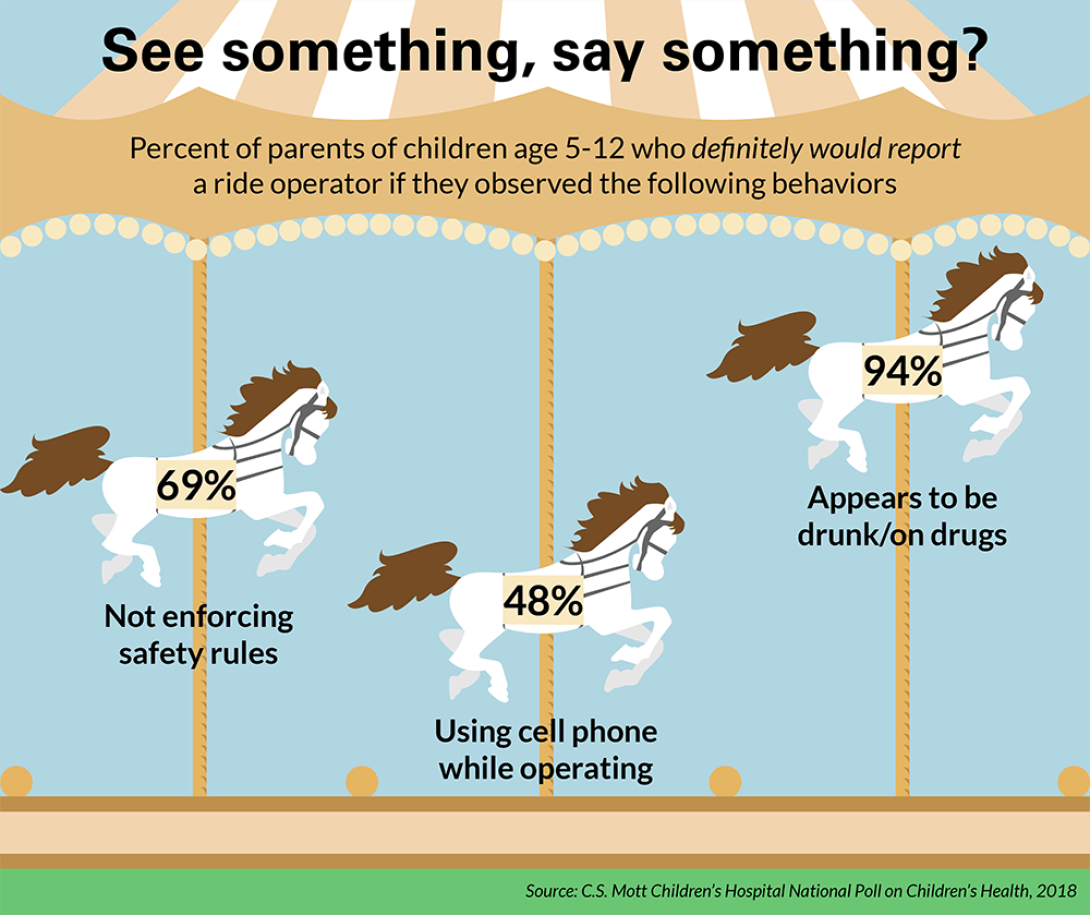Before enjoying thrill rides, carnival games and other fun activities, make sure your family has reviewed this safety checklist.
7:00 AM
Author |

It wouldn't be summer without a spin on the Ferris wheel or a hair-raising roller-coaster ride.
Those rites of passage can also be dangerous: Emergency rooms across the country saw 30,000 injuries linked to amusement parks and carnivals in 2016.
LISTEN UP: Add the new Michigan Medicine News Break to your Alexa-enabled device, or subscribe to our daily audio updates on iTunes, Google Play and Stitcher.
Many of those injuries and related hazards are preventable. But not all parents are aware of the risks, according to a new C.S. Mott Children's Hospital National Poll on Children's Health.
The survey found that 1 in 5 parents did not talk with their child about what to do if they got separated at an amusement park or carnival.
Parents also varied in their views about reporting unsafe ride operator behavior, with 94 percent saying they would definitely report suspicions that an operator was drunk or on drugs; 69 percent would report failure to enforce safety rules, such as seat belts or height restrictions. Fewer than half said they would report an operator using a cellphone.

Simple precautions are key.
"Planning ahead for incidents and contingencies can mean the difference between having a great day at the park or having your day take a really bad turn," says Marie Snodgrass, injury prevention program lead at Mott.
She shared advice for parents planning a trip to the amusement park or fair:
Amusement park safety tips
Speak up: Talk to your children about park employees exhibiting unsafe behaviors. Is the ride operator paying attention? Are they on their phone or do they seem distracted? Have a script to go over what kids should say if something doesn't seem right — and to not worry about upsetting anyone. Likewise, kids should speak up if a ride's strap or harness isn't fastened properly.
Follow the rules: Amusement park outings aren't cheap. Which is why some parents might try to convince an operator to allow a child on a ride because they are "so close" to meeting age or height requirements. But boarding a ride without meeting those requirements or without being otherwise ready can compromise a child's safety.
MORE FROM MICHIGAN: Sign up for our weekly newsletter
Stay connected: Have an action plan in place if kids become separated. Tell a child to stay put and not go looking for a parent or caretaker. Show your kids what a park employee looks like and what they are wearing. Be sure your kids have your cellphone number (not just in their cellphone) but also written on their hands or on a note in their pocket. Take a picture of your group before entering the park. Oftentimes, parents forget what their kids were wearing that morning. A photo helps parents give an accurate description to park security.
Check in often: For older kids, set up frequent check-ins and make sure everyone is clear on the location and time. Because batteries can easily drain from kids listening to music and watching videos, don't rely on phone-based check-ins. Make sure you identify a physical meetup location everyone is clear on.
Be watchful: It's a good idea to revisit "stranger danger" tips before a park visit. Parents should be especially careful with what they post on social media. Many people can see your location and other personal details. It's not far-fetched for a stranger armed with this information to cozy up to kids. Explain to children that just because adults know their names and other personal information, it doesn't mean they can be trusted.
Dress appropriately: Loose clothing can get caught on ride equipment, causing choke hazards and other issues. Stay clear of baggy clothing or flip-flops. Wear shoes that stay on the feet to avoid risk of footwear getting caught on something and causing injury.
Lather up and stay hydrated: The spinning and jostling of rides, being out in the hot sun and eating salty and sugary foods can make kids sick. Encourage kids to drink water and eat something substantial, not just junk food. Hydration is essential. Apply sunscreen 20 minutes before you go out — and every two hours after that — no matter the weather or temperature.

Explore a variety of healthcare news & stories by visiting the Health Lab home page for more articles.

Department of Communication at Michigan Medicine
Want top health & research news weekly? Sign up for Health Lab’s newsletters today!





